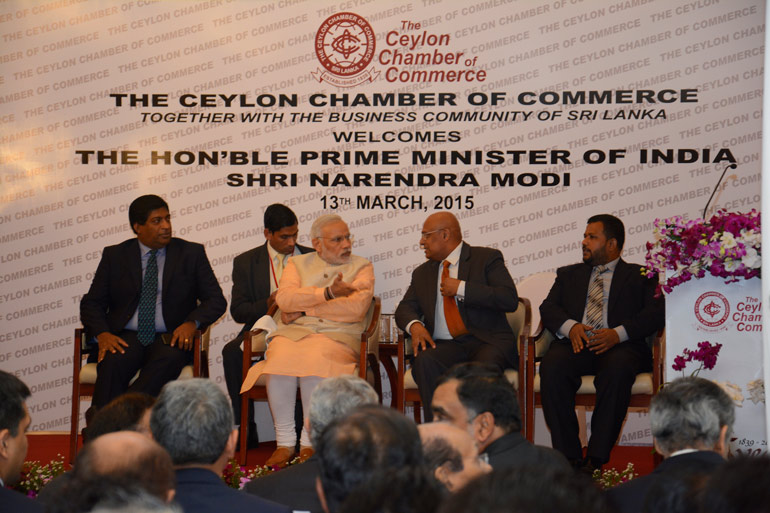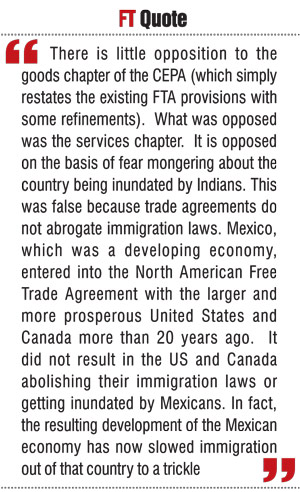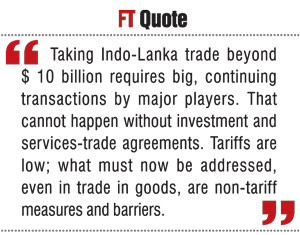Saturday Feb 21, 2026
Saturday Feb 21, 2026
Monday, 14 September 2015 00:00 - - {{hitsCtrl.values.hits}}
 Indian Prime Minister Narendra Modi at a forum organised by the Ceylon Chamber of Commerce in Colombo early this year as part of his official visit to Sri Lanka - File photo
Indian Prime Minister Narendra Modi at a forum organised by the Ceylon Chamber of Commerce in Colombo early this year as part of his official visit to Sri Lanka - File photo
Why trade agreements?
If Sri Lanka is to escape the middle income trap, it must increase exports. Not only of goods but of services. We can do this only by having legal frameworks that provide the flexibilty to participate in global value chains.

Sri Lanka’s labour costs are high relative to our competitors. We did not industrialsze when many others in Asia did. Our agricultural holdings are small and agricltural productivity leaves much to be desired. So we have to concentrate on high value-added segments in manufacturing and agriculture. And we must focus on services. No longer do goods and services exist in distinct compartments. But there are some modern services such as software and Business Process Outsourcing (BPO) that are standalone service exports.
The United National Front recognised the need to think beyond the confines of this island and participate in global value chains. To do that and to attract the investments needed to create new and attractive jobs, we need legal frameworks in the form of trade and investment agreements that cover both goods and services.
The UNF stated that trade and investment agreements with the United States, India, China, Singapore, South East Asia and other SAARC countries would be entered into and obtained after the the people’s approval was sought.
A politician, who campaigned on the promise of removing the plug that connected Sri Lanka to the world economy and then kept silent when the Rajapaksa Government sought to engage with the world economy, is on the warpath again. Undeterred by the abject failure of the plug theories and hoping the public would have forgotten about their disastrous trackrecord, this politician is spreading fear and misinformation about the long-delayed Comprehensive Economic Partnership Agreement with India. That is to be expected. What is of concern is that some professionals and their associations, who should know better, are aligning with these ill-informed protectionists.
Misconceptions
Sri Lanka was the first country to sign a bilateral trade agreement with India and was in line to be among the first to sign a Comprehensive Economic Partnership Agreement (CEPA) that covered investment and services. But Government changes on both sides in 2004 slowed down the process and then led to its stifling by a highly motivated and connected lobby.
Some of the misconceptions propagated by the opponents were:
It was not that there were no problems with the FTA in its first decade. The phytosanitary rules were implemented by Indian authorities in ways that amounted to non-tariff barriers, as shown by Verite Research.
Multichemi, which led the opposition, succeeded in Bangladesh and not in India. Munchee, a company that has succeeded both at home and abroad, was frustrated by court cases in Tamil Nadu which had little to do with trade rules. Legal-on-paper actions by certain Indian investors to exploit the low duties offered by the FTA by setting up Vanaspati factories in Sri Lanka were blocked by Indian authorities.
There were significant achievements by Sri Lankan companies in India. Colombo Dockyards succeeded in winning multiple government tenders, difficult to do if there was a systematic effort to block Sri Lankan exports. The Amante brand of lingerie marketed by MAS was rated as the Indian ‘Product of the Year’ for 2009 by Nielson.
This was no coordinated pattern of big brotherly bad behavior. What the facts suggest is the value of working together to resolve problems especially when both sides are new to trade liberalisation, including through the formal dispute settlement provisions that were not included in the FTA but were brought up in the CEPA discussions.
The least informed claim was that rising imports from India were bad for Sri Lanka. Indian imports increased because of the import of petroleum products by Lanka IOC. Another was the substitution of cheap Indian two-wheelers for the Japanese imports of yesteryear. It is silly to claim that obtaining cheaper products from one market instead of another is bad.
There were caps on tea and apparel exports into India from Sri Lanka. In an ideal world, there would not be. But the CEPA and preceding negotiations relaxed the conditions of the cap placed by India. Evidence points to an earlier lack of interest by Sri Lankan apparel exporters as a contributory factor. There was a 40% increase in apparel exports in 2009 over 2008 despite overall Sri Lankan exports to India declining by more than 28% in that recessionary year.
Services chapter opposition
There is little opposition to the goods chapter of the CEPA (which simply restates the existing FTA provisions with some refinements). What was opposed was the services chapter. It is opposed on the basis of fear mongering about the country being inundated by Indians. This was false because trade agreements do not abrogate immigration laws. Mexico, which was a developing economy, entered into the North American Free Trade Agreement with the larger and more prosperous United States and Canada more than 20 years ago. It did not result in the US and Canada abolishing their immigration laws or getting inundated by Mexicans. In fact, the resulting development of the Mexican economy has now slowed immigration out of that country to a trickle.
Movement of Indian professionals under the services chapter was to be limited to those directly attached to Indian firms that invest here (under Mode 3 services trade), except in one or two industries where there were shortages and no industry opposition. Those who raised the bogeyman of Indian professionals coming to Sri Lanka neglected to talk about Sri Lankans who need to be in India on work authorisations, who would be able to get their visas a lot easier if a legal framework exists.
Sri Lanka, the smaller partner, needs rules and dispute-resolution mechanisms more than India does. The CEPA is not about deals for setting up this or that export zone, or special dispensation to invest in one or another place. Trade agreements contain rules of behavior that a businessperson can depend on; that carry with them consequences if violated. They reduce risk for investors and traders.
In a Government of laws, international trade would also be governed by laws: international agreements well negotiated and implemented without discrimination. One would not have to know the minister or the secretary, one would be entitled to redress based on rights and obligations embodied in well-drafted legal texts.
Taking Indo-Lanka trade beyond $ 10 billion requires big, continuing transactions by major players. That cannot happen without investment and services-trade agreements. Tariffs are low; what must now be addressed, even in trade in goods, are non-tariff measures and barriers.
In the case of services trade, that is all that matters. And investment is all about estimating and managing risk. Agreements are needed to manage non-tariff measures and barriers, and in the final instance, risk, not only with India but with all our major trading partners. The Government has the mandate. It should not be held hostage by plug-pullers.